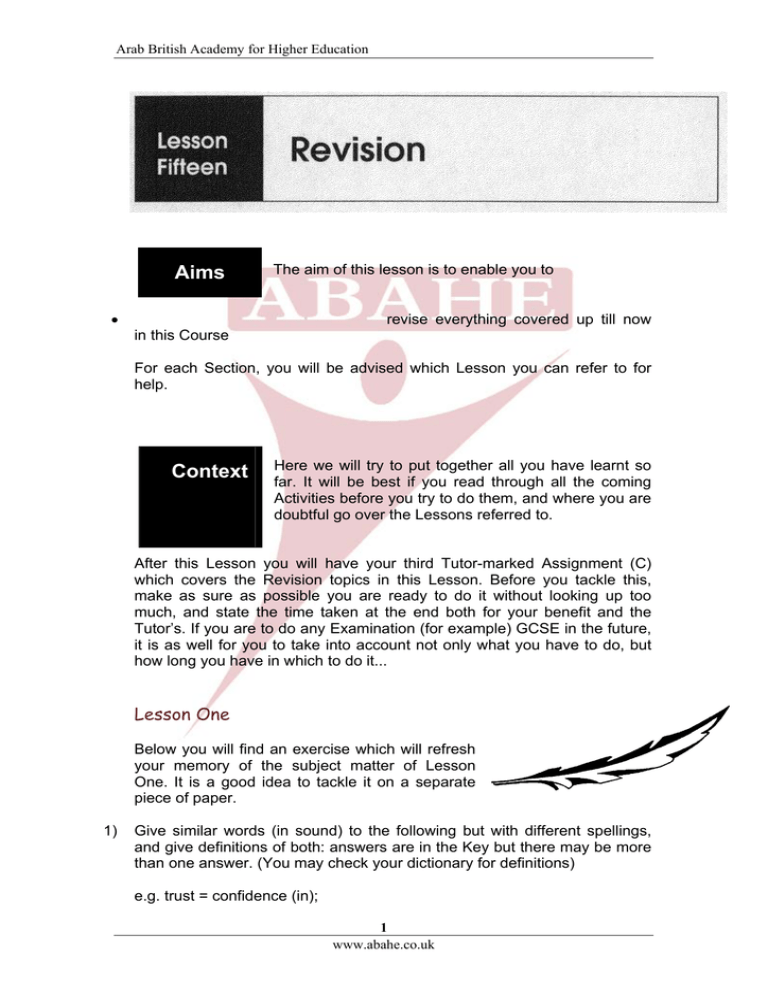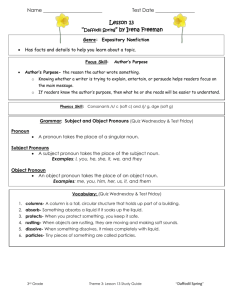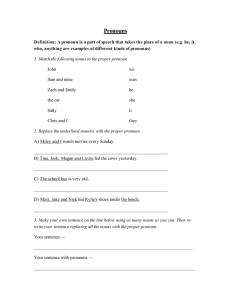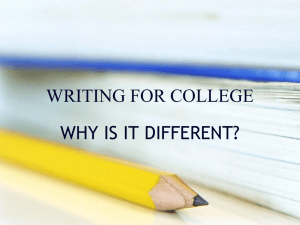
Arab British Academy for Higher Education
Aims
The aim of this lesson is to enable you to
revise everything covered up till now
in this Course
For each Section, you will be advised which Lesson you can refer to for
help.
Context
Here we will try to put together all you have learnt so
far. It will be best if you read through all the coming
Activities before you try to do them, and where you are
doubtful go over the Lessons referred to.
After this Lesson you will have your third Tutor-marked Assignment (C)
which covers the Revision topics in this Lesson. Before you tackle this,
make as sure as possible you are ready to do it without looking up too
much, and state the time taken at the end both for your benefit and the
Tutor’s. If you are to do any Examination (for example) GCSE in the future,
it is as well for you to take into account not only what you have to do, but
how long you have in which to do it...
Lesson One
Below you will find an exercise which will refresh
your memory of the subject matter of Lesson
One. It is a good idea to tackle it on a separate
piece of paper.
1)
Give similar words (in sound) to the following but with different spellings,
and give definitions of both: answers are in the Key but there may be more
than one answer. (You may check your dictionary for definitions)
e.g. trust = confidence (in);
1
www.abahe.co.uk
Arab British Academy for Higher Education
trussed = Past Tense of to truss = to tie.
a) bough b) ruff c) rite d) slay e) dye f) mite g) veil
2)
Give words with the same letters and sounds but different meanings: give
definitions of both meanings. Again there may be more than one answer:
e.g. cast = a) to throw; b) characters in a play
a) cow b) go c) down d) beat d) branch e) ram
Lesson Two
In the following sentences say what Parts of Speech are the words in bold:
if the word is a verb, give the Infinitive; i.e. the name of the verb... (starting
with to)
e.g. I have two partners, John and Mary.
I = Subject pronoun; partners = common noun;
Mary = proper noun
a)
b)
c)
d)
e)
The trees are covered with leaves today
They come quickly to see us
I wish you could see that crowd
The passengers brought their suitcases to the station
We were very happy to see them
Lesson Three
1)
Identify the type of Pronoun in bold print in the following sentences:
e.g. He is going to give me his book
he = Subject Pronoun; (to) me = Indirect Object Pronoun
a)
b)
him yesterday
c)
d)
e)
2)
Peter saw them in the supermarket
When did you last speak to your Father? I spoke to
I want you to come with us. Will you?
Can you do it? No, but they can.
Please give me my change.
Write out the Pronouns for the following:
e.g. Direct Object Pronoun 1st Plural = us
a) 3rd Singular Subject Pronoun (Masculine)
b) 2nd Plural Indirect Object Pronoun
2
www.abahe.co.uk
Arab British Academy for Higher Education
c) 3rd Plural Direct Object Pronoun
d) 1 st Singular Direct Object Pronoun
Lesson Four
1)
a)
b)
c)
d)
e)
2)
a)
b)
c)
d)
e)
Put the following Sentences into the Negative: (Use apostrophes where
you can...)
Have you got their present?
I am very pleased
Tom brought his friends with him
We will be seeing a great film tonight
She ought to have come!
Complete the following Sentences with Possessive Adjectives or Pronouns
whichever is best: say which you have used
I have____ pen; has she____ ?
You can go ______ way, and we shall go______.
Would she like some sugar in ____ tea?
If Tommy doesn’t get _____ own way, he sulks!
That bird has a thorn in ______ claw
Lesson Five
1)
a)
b)
c)
d)
e)
2.
a)
Put the following sentences into the Continuous Form: they are not all in
the Present Tense.
Paul began to feel hungry
We go to the theatre in the evening
They did not speak very clearly to us
These mountains are not covered with snow
The students learn at least two languages
Fill in the correct Preposition or Adverb in the following Sentences:
i) Andrew knocked _______ the door, and went ______ the room
ii) We were travelling so fast, we were soon able to go______ the other cars.
iii) Another way of saying to tie is to do _____
iv) Come ______, pull yourself______!*
v) If you are not too well, I can look ________ you
*
As pull has no Noun following it, the word missing is an Adverb (modifying
pull)
b)
Replace the following Verbs with Prepositions with Single Verbs:
go down; go up; go in, go out; come near; do in (slang)
3
www.abahe.co.uk
Arab British Academy for Higher Education
Lesson Six
Demonstrative Adjectives and Pronouns: this, that, these, those.
Complete the following Sentences and say which is an Adjective, and
which a Pronoun: there may be a choice of answer.
a) ____flower is far more beautiful than ________ (plural)
b) Can you see ______ trees over there? No, I can only see ______ right
here!
c) Which would like _____ one, or ______ one. Neither, I want ____ (plural)
d) ______ is the tallest tree in ______forest!
e) Who are the most hard working? ______ boys, or _____ girls?
Lesson Seven
1)
Put the following sentences into the Future using the Simple or Continuous
form, as appropriate:
a)
b)
c)
d)
e)
2)
We are not doing anything this evening
They don’t cross the road at the pedestrian crossing
He is not sure, but he is doing his best
She has to go, but she doesn’t want to go
Am I speaking English, or not?
Interrogatives (which? whose? etc) Put in the correct form in the spaces
a)
b)
c)
d)
e)
father’s
_____ is this book? It is not Paul’s
______ way should I go? This way or that?
Tracey is not sure of ______ she should do
_____ book would you prefer, this or that?
I never know ____ advice to follow, her mother’s, or her
All Rights Reserved © Arab British Academy for Higher Education
4
www.abahe.co.uk




